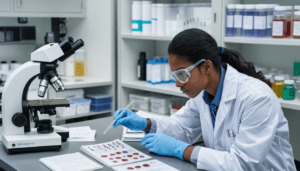 Medical Lab Technician Jobs: Your Complete Guide
Medical Lab Technician Jobs: Your Complete Guide
Medical lab technicians play a crucial role in the healthcare system. As the hidden heroes behind diagnostic results, they ensure accurate testing and analysis that guide patient care. With health services expanding rapidly, this career is growing in demand and offers a fulfilling path for those interested in both science and patient well-being. You will be able to get an idea about medical lab technician jobs easily by going through this article.
What is a Medical Lab Technician ?
Who is actually medical lab technician?
A medical lab technician (MLT) is a skilled professional who works behind the scenes in medical laboratories. They perform diagnostic tests on bodily fluids, tissues, and cells to detect diseases or conditions. Their work provides vital data that healthcare teams rely on to make accurate diagnoses and treatment plans. You will understand more in this medical lab technician job description.
Key responsibilites of a Medical lab Technician job?
The daily tasks of a medical lab technician job might surprise you with their variety and complexity. Here are some of their key duties:
- Conducting routine and specialized diagnostic tests, such as blood counts or chemical analyses.
- Preparing and analyzing samples like blood, urine, or tissue biopsies.
- Maintaining and calibrating laboratory equipment to ensure accuracy.
- Documenting results and adhering to strict quality control standards.
- Assisting in the research and development of new testing methods.
Requirements of Medical lab technician Jobs
Must need skills for Medical lab technician :
To excel as an MLT, certain skills are non-negotiable:
- Attention to detail: Even small errors can lead to incorrect diagnoses.
- Technical proficiency: Operating complex equipment isn’t optional—it’s central to the job.
- Problem-solving: Technicians must interpret results and troubleshoot issues effectively.
- Strong communication skills: They collaborate closely with doctors and lab scientists.
Educational Pathway and Certification
Becoming a medical lab technician requires a few steps, and it often begins with the right educational program.
Educational Requirements
Most aspiring MLTs pursue an associate degree in clinical laboratory science or a related field. Community colleges and technical schools offer structured programs that combine coursework with hands-on lab training. Some schools also provide optional bachelor’s degree tracks for those seeking career advancement.
Certification and Licensing
While not all states mandate certification, it significantly boosts employment opportunities. Associations like the American Society for Clinical Pathology (ASCP) and the American Medical Technologists (AMT) are trusted certifying bodies. MLTs often pass the ASCP Board of Certification (BOC) exam to become registered professionals. Depending on the state, additional licensing may be required.
For more information, check out the requirements for certification and licensing.
Job Market and Career Outlook
The demand for healthcare professionals, including MLTs, is on the rise due to an aging population and advancements in medical diagnostics.
Medical Lab Technician Job Demand and Growth Projections
According to recent data, the demand for medical lab technicians is expected to grow by 7% through 2030, faster than the average for other occupations. Opportunities are particularly abundant in urban hospitals and large diagnostic labs. Find out more about job openings and salaries on platforms like Indeed.
Work Settings and Opportunities
MLTs are needed across diverse settings, including:
- General hospitals and specialized clinics.
- Private diagnostic laboratories.
- Research institutions and pharmaceutical companies.
In rural areas with limited healthcare resources, MLTs may be the only professionals conducting lab work, making their roles even more impactful.
Compensation and Benefits
Medical lab technicians are well-compensated for their technical expertise and dedication. Salary factors include experience, location, and type of employer.
Average Salary Overview
The average salary for MLTs in the U.S. is approximately $54,000 per year, according to the U.S. Bureau of Labor Statistics. Entry-level positions may start at $40,000, while experienced technicians in specialized roles can make upwards of $70,000 annually.
Factors Affecting Pay
- Experience: Senior technicians earn significantly more.
- Location: Urban centers like New York or California offer higher salaries but often come with a higher cost of living.
- Industry: Research settings and specialized labs generally pay the most.
For insights into the highest-paying MLT opportunities, check out this link on ZipRecruiter.
Challenges and Rewards of the Role
Every career has its ups and downs, and being an MLT is no different. However, for most in the field, the rewards far outweigh the challenges.
Common Challenges
- Physical demands: Long hours of standing and operating equipment can take a toll.
- Time pressures: Meeting tight deadlines, especially in emergencies, can be stressful.
- Emotional toll: Handling test results tied to severe illnesses isn’t easy.
Why It’s a Rewarding Career
Despite the challenges, this career offers meaningful work. MLTs contribute directly to saving lives and improving health outcomes. Knowing that their skills connect patients to effective treatments makes the effort worthwhile.
Conclusion
Jobs for medical lab technicians are more than just a career—they’re a chance to play a vital role in healthcare. With growing demand, competitive salaries, and the ability to impact lives daily, this profession offers a fulfilling path for aspiring healthcare workers. Whether you’re just starting your journey or looking for a career shift, the field of medical lab technology holds endless promise.
